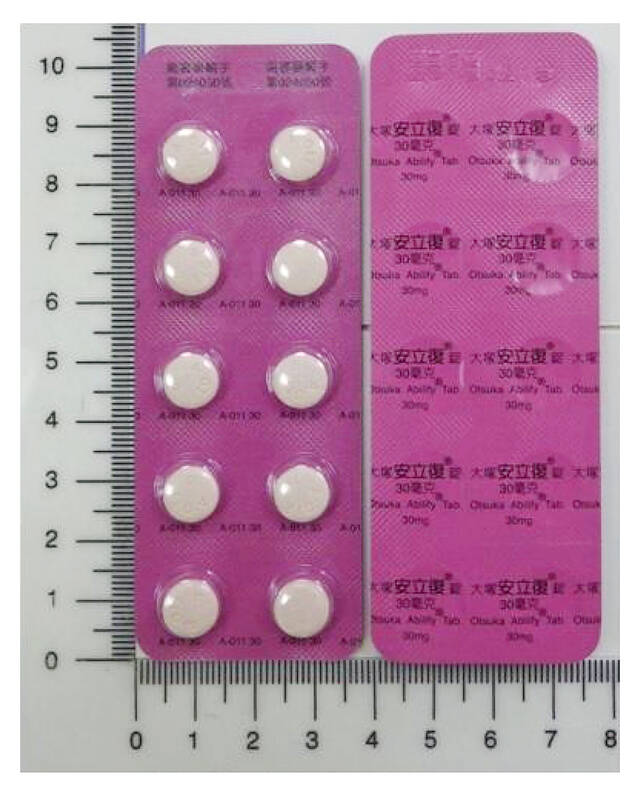More than 1.78 million tablets of an antipsychotic medication have been recalled due to cross-contamination of pharmaceutical ingredients during the manufacturing process, the Food and Drug Administration (FDA) said on Tuesday.
A batch of 5mg Otsuka Abilify (aripiprazole) tablets, or more than 1.43 million doses, and two batches of Otsuka Ability (aripiprazole) 30mg tablets, or about 354,410 doses, have been recalled, the FDA said.
The medication is used to treat several mental health conditions, including schizophrenia, bipolar disorder, autism spectrum disorder and Tourette’s syndrome.

Photo courtesy of the Food and Drug Administration
On April 25, routine monitoring of international alerts showed that the US Food and Drug Administration issued a recall for the two dosage forms of Otsuka Ability (aripiprazole) due to cross-contamination from extremely small amounts of an active pharmaceutical ingredient during the manufacturing process, FDA Deputy Director-General Wang Te-yuan (王德原) said.
Insufficient cleaning of equipment at the production site was the likely cause, Wang said.
The two forms of the medication are widely used in Taiwan.
More than 7.59 million 5mg tablets were used in Taiwan in 2022, while NHI reimbursement applications tallied about 238,000 30mg tablets, a National Health Insurance Administration report said last year.
Aripiprazole is an active ingredient used to treat schizophrenia in adults and adolescents, and for bipolar disorder in children aged 10 to 17, the FDA said.
It is also used to treat irritability associated with autistic disorder in pediatric patients aged six to 17, it said.
Separately, the FDA said that fresh strawberries from Japan would remain subject to batch-by-batch border inspections after a new shipment was found to contain a pesticide that is banned in Taiwan.
The shipment of 24kg of strawberries from Momofuku Shoji Co would either be returned to the country of origin or destroyed, it said.
Sample testing on April 17 found that the strawberries contained 0.04 parts per million of acrinathrin, a synthetic pyrethroid that has a high insecticidal activity against a range of insects, including mites.
Acrinathrin is a banned pesticide that cannot be used on strawberries in Taiwan, FDA Deputy Director-General Lin Chin-fu (林金富) said.
Of the 812 batches of Japanese strawberries inspected from Oct. 29 last year to April 29, 32 failed to meet Taiwan’s safety standards, mostly because they were found to have excessive levels of pesticide residue, Lin said.
Since June 1 last year, fresh strawberries from Japan have been subject to 100 percent checks at the border, a measure that was supposed to be lifted at the end of last month, Lin said.
However, because shipments of strawberries continue to fail safety inspections, every shipment of imported Japanese strawberries would be inspected until Dec. 31, he said.

‘DENIAL DEFENSE’: The US would increase its military presence with uncrewed ships, and submarines, while boosting defense in the Indo-Pacific, a Pete Hegseth memo said The US is reorienting its military strategy to focus primarily on deterring a potential Chinese invasion of Taiwan, a memo signed by US Secretary of Defense Pete Hegseth showed. The memo also called on Taiwan to increase its defense spending. The document, known as the “Interim National Defense Strategic Guidance,” was distributed this month and detailed the national defense plans of US President Donald Trump’s administration, an article in the Washington Post said on Saturday. It outlines how the US can prepare for a potential war with China and defend itself from threats in the “near abroad,” including Greenland and the Panama

A wild live dugong was found in Taiwan for the first time in 88 years, after it was accidentally caught by a fisher’s net on Tuesday in Yilan County’s Fenniaolin (粉鳥林). This is the first sighting of the species in Taiwan since 1937, having already been considered “extinct” in the country and considered as “vulnerable” by the International Union for Conservation of Nature. A fisher surnamed Chen (陳) went to Fenniaolin to collect the fish in his netting, but instead caught a 3m long, 500kg dugong. The fisher released the animal back into the wild, not realizing it was an endangered species at

The Chinese Nationalist Party (KMT) is maintaining close ties with Beijing, the Democratic Progressive Party (DPP) said yesterday, hours after a new round of Chinese military drills in the Taiwan Strait began. Political parties in a democracy have a responsibility to be loyal to the nation and defend its sovereignty, DPP spokesman Justin Wu (吳崢) told a news conference in Taipei. His comments came hours after Beijing announced via Chinese state media that the Chinese People’s Liberation Army’s Eastern Theater Command was holding large-scale drills simulating a multi-pronged attack on Taiwan. Contrary to the KMT’s claims that it is staunchly anti-communist, KMT Deputy

The High Prosecutors’ Office yesterday withdrew an appeal against the acquittal of a former bank manager 22 years after his death, marking Taiwan’s first instance of prosecutors rendering posthumous justice to a wrongfully convicted defendant. Chu Ching-en (諸慶恩) — formerly a manager at the Taipei branch of BNP Paribas — was in 1999 accused by Weng Mao-chung (翁茂鍾), then-president of Chia Her Industrial Co, of forging a request for a fixed deposit of US$10 million by I-Hwa Industrial Co, a subsidiary of Chia Her, which was used as collateral. Chu was ruled not guilty in the first trial, but was found guilty